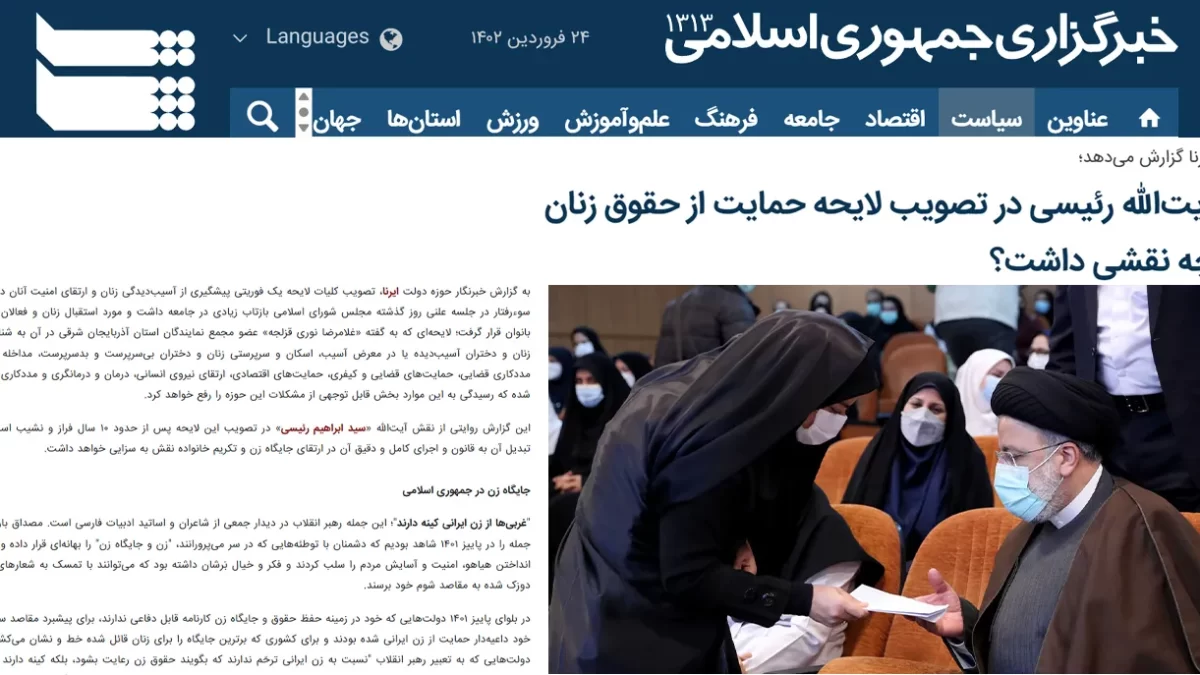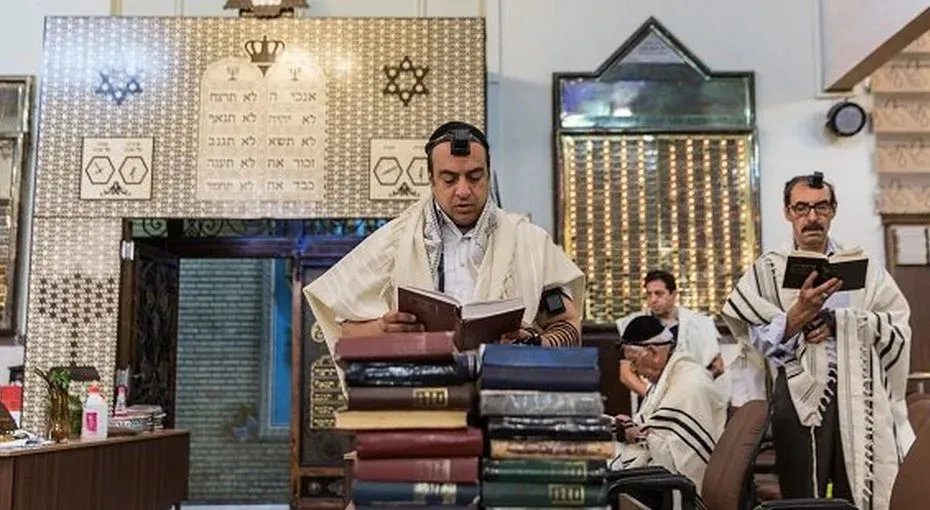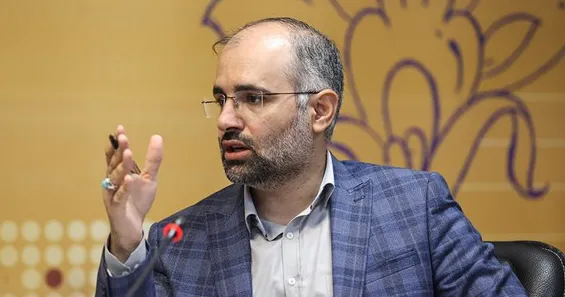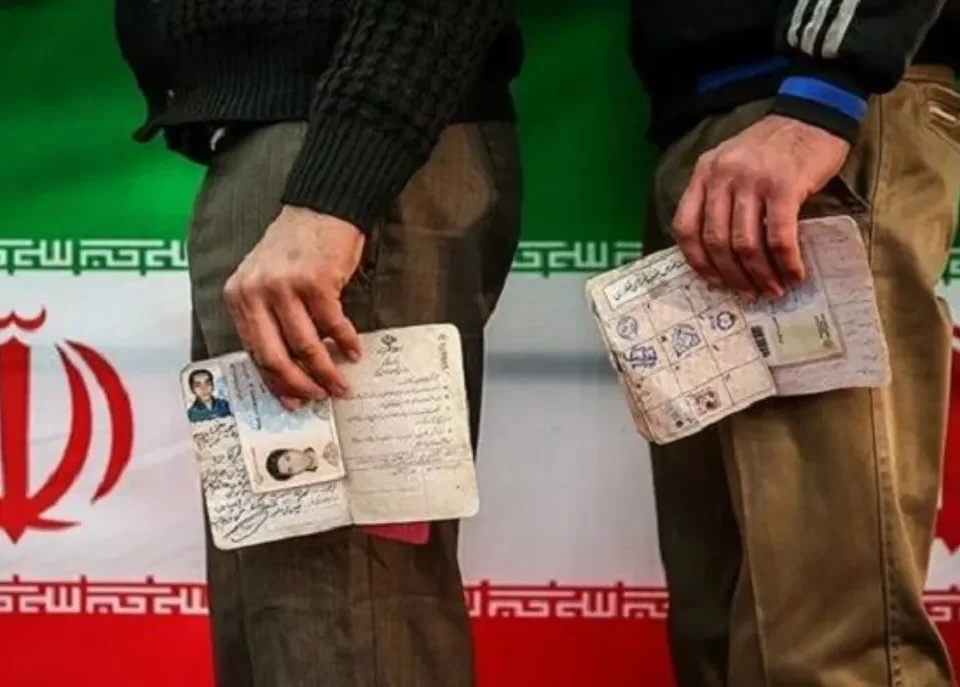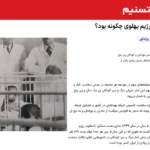
Media Review: Tasnim News Agency and Manipulative Handling of Information and Statistics
May 6, 2023
Media Review: Propaganda, the Dictator’s Plan for “Neighbor’s Daughter”
May 7, 2023Turning the media into an advertising agency has always been an important strategy for dictators to maintain their power, as it enables them to shape the mindset of the audience. Those in power have always sought to shape social realities through media and public relations, portraying them as they desire. From this perspective, controlling the media has always been key for them. That is why the internet and social networks have now become the main enemy and a threat to the lives of dictators, as they have made information control difficult for them.
Today, it is not easy to deceive public opinion because the audience does not receive information from a closed media cycle but has access to various sources of information. However, when the mindset of the government’s media team is limited to the pre-technology and communication era, the idea remains that they can still shape the mindset of the audience with disinformation and fake news.
To clarify the issue, please pay attention to this report published by the Islamic Republic News Agency (IRNA) on April 11, 2023, titled “What role did Ayatollah Raisi play in the approval of the Women’s Rights Support Bill?”
In this report, an IRNA journalist reviews the process of drafting and approving the “Prevention of Women’s Harm and Support for Their Security Bill” and discusses the role of Ayatollah Ibrahim Raisi, the President, in the drafting and approval of this bill. The report states:
“In a situation where Western powers, with the help of their pedestrian system, are trying to hinder Iranian women from achieving their serious priorities, the government, regardless of controversies and distractions, has prioritized attention to the women’s sphere in its plans. From the very first days in office, the government of Ayatollah Raisi has dedicated all its efforts and capabilities to pursue women’s demands and elevate their status. Even on the days when the West was intensively attempting to portray a false image of the Islamic Republic system and government’s treatment of women, Iran, with this approach, excluded itself from the Women’s Status Commission. On January 17, 2023, a congress titled ‘Influential Women’ was held in Tehran, with the presence of women from 90 countries, hosted by the First Lady of our country, the wife of the President.”
During this meeting, Ayatollah Raisi, within the framework of his concern for protecting women’s rights, expressed appreciation for those involved in the drafting of the Women’s Rights Support Bill. While serving as the head of the judiciary, he devoted all his attention to bringing this bill to fruition, stating during one of the sessions of the Supreme Judicial Council, “I hope that in the mentioned bill and similar bills based on legal principles, cultural, social, and various aspects are considered. Regarding this bill… I must say that we were also seeking to bring this matter to a conclusion in these days, and God willing, we will succeed.”
In line with the serious attention of the judiciary during Ayatollah Raisi’s tenure to safeguarding women’s status, after extensive expert reviews and measures on the “Protection, Dignity, and Security of Women against Violence Bill,” the bill is sent to the then government, and its text is publicly published for further clarification to the public.
Ayatollah Raisi, who, after the judiciary, assumed the highest executive position in the country, did not hesitate to make any effort for women’s rights. He appointed a special official to pursue social rights and freedoms, in collaboration with the Deputy for Women’s Affairs and other relevant institutions, to take practical and effective steps towards women’s security.
IRNA, in conclusion, summarizes its report as follows:
The Protection, Dignity, and Security of Women against Violence Bill, now renamed as the “Prevention of Women’s Vulnerability and Support for their Security Bill,” despite Ayatollah Raeesi’s efforts within the judiciary to bring the bill to fruition during the 11th and 12th governments, was marginalized, and the then-government did not progress the work in this regard. However, with Ayatollah Raeesi now at the helm of the executive branch, this bill has been approved by the 13th government through serious follow-ups in the Islamic Consultative Assembly, demonstrating the commitment of the popularly elected prime minister to stand up for this bill, which encompasses women’s security and the protection of their rights. Despite pressures from certain media outlets and individuals against this bill, he defended it in order to consolidate and safeguard women’s rights, a matter that received praise from the nation’s lawyers and the legal community.
IRNA attributes the approval of the Prevention of Women’s Vulnerability and Support for their Security Bill to Ayatollah Raeesi’s efforts within the judiciary, stating that the government of Hassan Rouhani did not bring this bill to fruition, and it was the sincere pursuit of Raeesi that led to its approval in the 11th Parliament.
In this regard, it is essential to note a few key points:
1. This bill was drafted not by the judiciary under the leadership of Ayatollah Raeesi but by the Rouhani government. However, according to the law, bills with a judicial aspect must be drafted or approved by the judiciary. Therefore, the government referred this bill to the judiciary, and with the repeated follow-ups by the Women’s Deputy of the Rouhani government and the representatives of the 10th Parliament, it was eventually returned to the Rouhani government after some modifications, including the inclusion of the word “protection” in the title of the bill. The government then submitted it to the 10th Parliament.
2. Considering the process of approving this bill in the three branches of power, it indicates that the judiciary referred this bill to the Rouhani government in Mehr 1398 (September/October 2019), and the then-government presented it to the Parliament in Tir 1399 (June/July 2020) after its details were approved in specialized committees. This means that this bill was reviewed, approved, and submitted to the Islamic Consultative Assembly in less than 9 months within the government. Anyone familiar with the work process of the Parliament knows that reviewing and approving urgent bills usually takes about a year. However, since the 11th Principlist government did not have the foundation for cooperation with the Rouhani government, it unduly delayed the approval of this bill. After three years, and under conditions where state violence against women had escalated, it was brought to the public floor of the Parliament and approved.
3. However, the main issue is not whether this bill is credited to Raeesi or Rouhani; the main issue is the deceptive behavior of the Parliament and the government towards women’s rights. Society is well aware that this government and Parliament have provided the least support for women and continue to do so. If this bill, which has not yet been approved by the Guardian Council and its final version is unclear, reaches approval in the Parliament, it is merely an attempt to mislead public opinion and improve the tarnished image of the anti-women establishment of the Islamic Republic in the global community. Otherwise, who does not know that:
– Basij, with the support of the Raeesi government, emerged victorious and committed the murder of “Mahsa Amini.”
– The 11th Parliament, instead of pursuing justice for the blood
– The 11th Parliament, instead of pursuing justice for Mahsa Amini’s bloodshed and sympathizing with the wounded Iranian society, has supported the “Basij Guidance Patrol” and downplayed it as an unintentional incident.
– Chemical attacks on girls’ schools have faced indifference from the Ministry of Intelligence, and no one is held accountable.
– Despite the explicit and widespread opposition of the people to compulsory hijab, the government, law enforcement forces, and parliamentary representatives threaten women opposing compulsory hijab in various ways every day. The Ministry of Education has made the provision of educational services to girls conditional on observing Islamic hijab, and the police enforce it by cracking down on girls and making arrests.
Therefore, this report is an example of propaganda and resorting to forged information to divert public opinion from the realities faced by Iranian women. The government’s media team knows that wounded Iranian women are protesting against state violence and demanding a change in the current situation. That’s why they have resorted to one of the well-known tactics of propaganda, which is “responding to the needs of the audience,” to repair the image of the anti-women government and divert attention from the “Women, Life, Freedom” movement by entertaining external observers. Otherwise, violence against women is not a concern for the perpetrators of state violence against women, who strive to stop it or see any effort in that direction as a matter of pride for themselves.
مرور رسانهها؛ خبرگزاری ایرنا و بزک فریبکارانه دولت ضد زن رئیسی
تبدیل رسانه به بنگاه تبلیغاتی همواره استراتژی مهمی برای دیکتاتورها بوده است تا پایههای قدرت خود را حفظ کنند، زیرا رسانه آنها را قادر میساخت تا ذهنیت مخاطب را شکل دهند. صاحبان قدرت از طریق رسانهها و روابط عمومیها، همواره میکوشیدند واقعیتهای اجتماعی را آنگونه که دوست دارند، شکل دهند. از این منظر، در دست داشتن کنترل رسانه همیشه برای آنها کلیدی بوده است. به همین دلیل اینترنت و شبکههای اجتماعی امروزه به دشمن اصلی و بلای جان دیکتاتورها تبدیل شدهاند، چراکه کنترل اطلاعات را برای آنها دشوار کرده است.
امروز به سادگی نمیتوان افکار عمومی را فریب داد، زیرا مخاطب اطلاعات را از یک چرخه بسته رسانهای دریافت نمیکند بلکه به منابع اطلاعاتی مختلفی دسترسی دارد. اما وقتی ذهنیت تیم رسانهای دولت محدود به دوره ماقبل شکوفایی تکنولوژیهای اطلاعاتی و ارتباطی باشد، بر این اندیشه است که هنوز با دیس اینفورمیشن و اخبار جعلی میتوان ذهنیت مخاطب را شکل داد.
برای روشن شدن مساله، لطفا به این گزارش خبرگزاری جمهوری اسلامی (ایرنا) که روز ۲۱ فروردین ۱۴۰۲ با عنوان «آیتالله رئیسی در تصویب لایحه حمایت از حقوق زنان چه نقشی داشت؟» منتشر شده است، دقت کنید.
خبرنگار ایرنا در این گزارش با مرور روند تدوین و تصویب کلیات «لایحه پیشگیری از آسیبدیدگی زنان و حمایت از امنیت آنان»، به نقش آیتالله ابراهیم رئیسی، رییس جمهوری در تدوین و تصویب این لایحه پرداخته و آورده است:
- در شرایطی که غربیها با کمک پیادهنظام خود تلاش دارند زنهای ایرانی را از رسیدن به اولویتهای جدی خود بازدارند، دولت بدون توجه به جنجالها و حاشیهها، توجه به حوزه زنان را در اولویت برنامههای خود قرار داد.
- دولت آیتالله رئیسی از همان روزهای نخست که بر سر کار آمد، تمام توان و تلاش خود را برای پیگیری مطالبات و ارتقای جایگاه زنان به کار گرفت و درست در روزهایی که غرب به شدت در تکاپو بود تا تصویر غلطی از نظام و دولت جمهوری اسلامی در برخورد با زنان به جهان مخابره کند و با همین رویکرد ایران را از کمیسیون مقام زن حذف کرد، ۲۷ دی ماه ۱۴۰۱ کنگرهای تحت عنوان «زنان تاثیرگذار» با حضور بانوانی از ۹۰ کشور در تهران برگزار شد که میزبانی آن را همسر رییس جمهوری کشورمان بر عهده داشت.
- آیتالله رئیسی در همان نشست در چهارچوب دغدغهای که در حفظ حقوق زنان دارد، با اشاره به لایحه حمایت از حقوق زنان از دستاندرکاران تدوین این لایحه تقدیر کرد و در مدتی که سکاندار دستگاه قضایی بود، با همین نگاه تمام اهتمام خود را برای به سرانجام رساندن این لایحه به کار گرفت و در یکی از جلسات شورای عالی قضایی بیان کرد: «امیدوارم در لایحه مذکور و لایحههای مشابه این لایحه که مطرح است و علیالقاعده حقوقی است، ابعاد فرهنگی، اجتماعی و جهات مختلف دیده شود. در خصوص این لایحه … باید بگویم ما هم به دنبال این بودیم که در این روزها کار به سرانجام برسد و انشاالله میرسد.»
- در راستای اهتمام جدی دستگاه قضایی در دوران آیتالله رئیسی برای حفظ جایگاه زنان، پس از بررسی و اقدامات کارشناسی گسترده بر روی «لایحه صیانت، کرامت و تامین امنیت بانوان در برابر خشونت»، لایحه به دولت وقت ارسال میشود و در جهت شفافسازی هرچهبیشتر برای مردم، متن آن بهصورت عمومی انتشار یافت.
- آیتالله رئیسی که پس از قوه قضاییه، در قامت عالیترین مقام اجرایی کشور قرار گرفت، در صدر قوه مجریه هم از هیچ تلاشی برای حقوق زنان دریغ نکرد و یک مسوول ویژه برای پیگیری حقوق و آزادیهای اجتماعی منصوب کرد تا با همکاریِ معاونت امور زنان و سایر دستگاههای ذیربط بتوانند در امنیت زنان گام عملی و موثر بردارند.
ایرنا در خاتمه، گزارش خود را اینگونه جمعبندی کرده است:
لایحه صیانت، کرامت و تامین امنیت بانوان در برابر خشونت که اکنون به «لایحه پیشگیری از آسیبدیدگی زنان و حمایت از امنیت آنان» تغییر نام یافته، بهرغم تلاشهای آیتالله رئیسی در دستگاه قضا برای به ثمر نشاندن لایحه در دولت یازدهم و دوازدهم به حاشیه کشانده شد و دولت وقت در این زمینه کار را به جایی نرساند. اکنون اما با حضور آیتالله رئیسی در راس قوه مجریه، این لایحه با پیگیریهای جدی دولت سیزدهم در مجلس شورای اسلامی به تصویب رسید و رییس دولت مردمی نشان داد از همان روزهایی که در عدلیه بود، پای این لایحه که امنیت و حفظ حقوق زنان را در بر دارد، ایستاده است و با وجود فشارهای برخی رسانهها و شخصیتها علیه این لایحه، در دفاع از این لایحه ایستادگی کرد تا تثبیت و صیانت از حقوق زنان را به فرجام برساند؛ موضوعی که تحسین وکلای ملت و جامعه حقوقی کشور را هم در پی داشت.»
ایرنا تصویب لایحه پیشگیری از آسیبدیدگی زنان و حمایت از امنیت آنان را نتیجه تلاشهای آیتالله رئیسی در دستگاه قضا عنوان کرده و مدعی است دولت «حسن روحانی» کار این لایحه را به جایی نرساند و پیگیریهای مجدانه رئیسی سبب تصویب این لایحه در مجلس یازدهم شد.
در این خصوص یادآوری چند نکته ضروری است:
۱- این لایحه نه توسط قوه قضاییه به رهبری آیتالله رئیسی بلکه در دولت روحانی تدوین شد. ولی از آنجا که مطابق قانون، لوایحی که بار قضایی دارند باید توسط قوه قضاییه تدوین یا تایید شوند، این لایحه از طرف دولت به قوه قضاییه ارجاع و با پیگیریهای مکرر معاونت زنان دولت حسن روحانی و نمایندگان زن دوره دهم مجلس شورای اسلامی بالاخره پس از اعمال برخی تغییرات، از جمله گنجاندن کلمه «صیانت» در عنوان لایحه، آن را به دولت روحانی بازگرداند و دولت نیز آن را به مجلس دهم تقدیم کرد.
۲- توجه به روند تصویب این لایحه در قوای سهگانه نشان میدهد که قوه قضاییه این لایحه را در مهر ماه ۱۳۹۸ به دولت روحانی ارجاع داد و دولت وقت پس از تصویب جزییات آن در کمیتههای تخصصی، این لایحه را در تیر ماه ۱۳۹۹ به مجلس ارایه کرد؛ یعنی این لایحه کمتر از ۹ ماه در دولت بررسی، تصویب و به مجلس شورای اسلامی تقدیم شد. هر کس با روند کار مجلس آگاه است، میداند بررسی و تصویب لوایح یک فوریتی در آن حدود یک سال طول میکشد. اما از آنجا که دولت اصولگرای یازدهم بنای همکاری با دولت روحانی را نداشت، در تصویب این لایحه بیش از حد معمول تعلل کرد و پس از سه سال، آن هم در شرایطی که خشونت دولتی علیه زنان به اوج رسیده بود، آن را به صحن علنی مجلس آورد و تصویب کرد.
۳- مساله اصلی اما ثبت این لایحه به نام رئیسی یا روحانی نیست، مساله برخورد فریبکارانه مجلس و دولت با حقوق زنان است. جامعه با این واقعیت آشنا است که این دولت و مجلس کمترین حمایتی از زنان نکرده و نمیکنند و اگر این لایحه که البته هنوز توسط شورای نگهبان تایید نشده است و روشن نیست نسخه نهایی آن مرهمی بر زخمهای زنان ایران زمین باشد یا نه، به تصویب مجلس رسیده، تنها تلاشی برای گمراه کردن افکار عمومی و گریم چهره ضد زن نظام جمهوری اسلامی در جامعه جهانی است، وگرنه کیست نداند که:
- گشت ارشاد با حمایت دولت رئیسی از پستو بیرون آمد و جنایت قتل «مهسا امینی» را رقم زد؛
- مجلس یازدهم به جای پیگیری خون مهسا امینی و همدردی با جامعه زخم خورده ایرانی، از پلیس «گشت ارشاد» حمایت و آن را به یک حادثه غیرارادی تقلیل داد؛
- حمله شیمیایی به مدارس دخترانه با بیتفاوتی وزارت اطلاعات روبهرو شده است و کسی پاسخگو نیست؛
- به رغم مخالفت آشکار و گسترده مردم با حجاب اجباری ولی دولت و نیروی انتظامی و نمایندگان مجلس هر روز به طرق مختلف زنان مخالف حجاب اجباری را تهدید میکنند. وزارت آموزش و پرورش ارایه خدمات آموزشی به دختران را مشروط به رعایت حجاب اسلامی کرده است و پلیس برای دختران خط و نشان میکشد و قس علی هذا.
بنابراین، این گزارش مصداق پروپاگاندا و توسل به اطلاعات جعلی برای انحراف افکار عمومی از واقعیتهایی است که بر زنان ایران میرود. تیم رسانهای دولت میداند که زنان زخم خورده ایران نسبت به خشونت دولتی معترض و خواهان تغییر وضع موجود هستند، به همین دلیل آنها به یکی از تاکتیکهای شناخته شده پروپاگاندا، یعنی «پاسخ به نیاز مخاطبان» روی آوردهاند تا هم چهره ضد زن دولت را ترمیم کنند و هم با سرگرم کردن ناظران بیرونی، جنبش «زن، زندگی، آزادی» را به حاشیه ببرند، وگرنه خشونت علیه زنان دغدغه بانیان خشونت دولتی علیه زنان نیست که برای توقف آن بکوشند یا تلاشی در این راستا را برای خود افتخاری بدانند.

